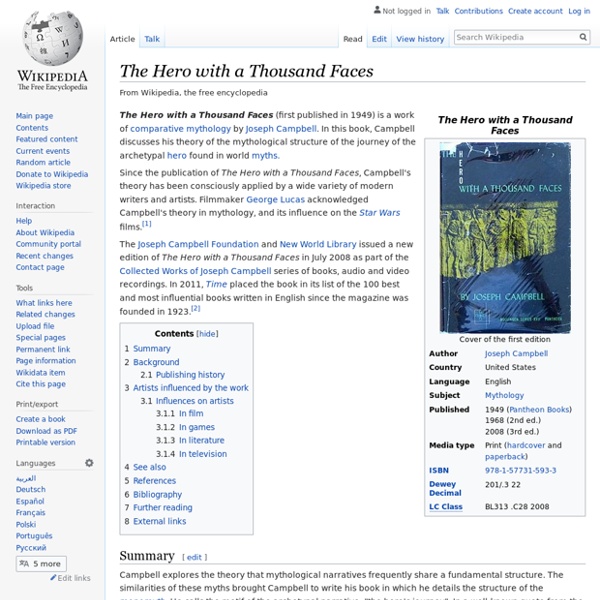The Hero W/ A Thousand Faces ~ Joseph Campbell

Leaves of Grass ~ Walt Whitman
Leaves of Grass is a poetry collection by the American poet Walt Whitman (1819–1892). Though the first edition was published in 1855, Whitman spent his entire life writing and re-writing Leaves of Grass,[1] revising it in several editions until his death. This resulted in vastly different editions over four decades—the first a small book of twelve poems and the last a compilation of over 400 poems. The poems of Leaves of Grass are loosely connected and each represents Whitman's celebration of his philosophy of life and humanity. This book is notable for its discussion of delight in sensual pleasures during a time when such candid displays were considered immoral. Publication history and origin[edit] Initial publication[edit] The first edition was very small, collecting only twelve unnamed poems in 95 pages.[7] Whitman once said he intended the book to be small enough to be carried in a pocket. The title Leaves of Grass was a pun. Republications[edit] "Deathbed edition"[edit] Analysis[edit]
Svět se neustále zlepšuje sexuálním stykem idejí
Svět – přesněji řečeno jeho lidské přetváření – se neustále zlepšuje. Navzdory občasnému zaškytnutí, během nějž se na čas zhorší, aby se opět začal zlepšovat na vyšší úroveň, než na které byl před zhoršením. To tvrdí anglický vědecký publicista Matt Ridley ve své nejnovější knize The Rational Optimist: How Prosperity Evolves (Racionální optimista. Ridley je původním vzděláním biolog a velká část jeho prací se soustřeďuje na popularizaci vědy. Racionální optimismus, nebo naivní idealismus? Při popisu Ridleyho představ skvělé, geniální, pestré a bohaté budoucnosti se místy neubráníme otázce, zda sledujeme racionální optimismus, či naivní idealismus, nebo si z nás dělá legraci. Víru v lepší budoucnost, či přinejmenším zvědavost, Ridley udržuje otázkou: Podíváme-li se na pokrok, kterým lidstvo prošlo a stále prochází, jak nás může vůbec napadnout, že by se měl někdy zastavit nebo zvrátit? Homo dynamicus Ambice se přetváří v příležitost. Obchodování
A People's History of the US ~ Howard Zinn
A People's History of the United States is a 1980 non-fiction book by American historian and political scientist Howard Zinn. In the book, Zinn seeks to present American history through the eyes of the common people rather than political and economic elites. A People's History has been assigned as reading in many high schools and colleges across the United States.[1] It has also resulted in a change in the focus of historical work, which now includes stories that previously were ignored.[2] The book was a runner-up in 1980 for the National Book Award. It has been frequently revised, with the most recent edition covering events through 2005. In 2003, Zinn was awarded the Prix des Amis du Monde Diplomatique for the French version of this book, Une histoire populaire des États-Unis.[3] More than two million copies have been sold. Reviews have been mixed. In a 1998 interview, Zinn said he had set "quiet revolution" as his goal for writing A People's History. Overview[edit]
Flaubert's Parrot
Flaubert's Parrot is a novel by Julian Barnes that was shortlisted for the Booker Prize in 1984 and won the Geoffrey Faber Memorial Prize the following year. The novel recites amateur Gustave Flaubert expert Geoffrey Braithwaite's musings on his subject's life, and his own, as he looks for a stuffed parrot that inspired the great author. Plot summary[edit] Although the main focus of the narrative is tracking down the parrot, many chapters exist independently of this plotline, consisting of Braithwaite's reflections, such as on Flaubert's love life and how it was affected by trains, and animal imagery in Flaubert's works and the animals with which he himself was identified (usually a bear, but also a dog, sheep, camel and parrot). Themes[edit] External links[edit]
Related:
Related:



